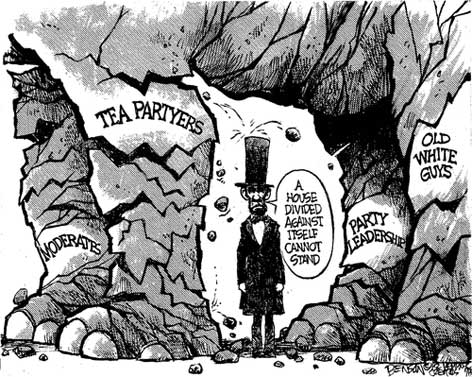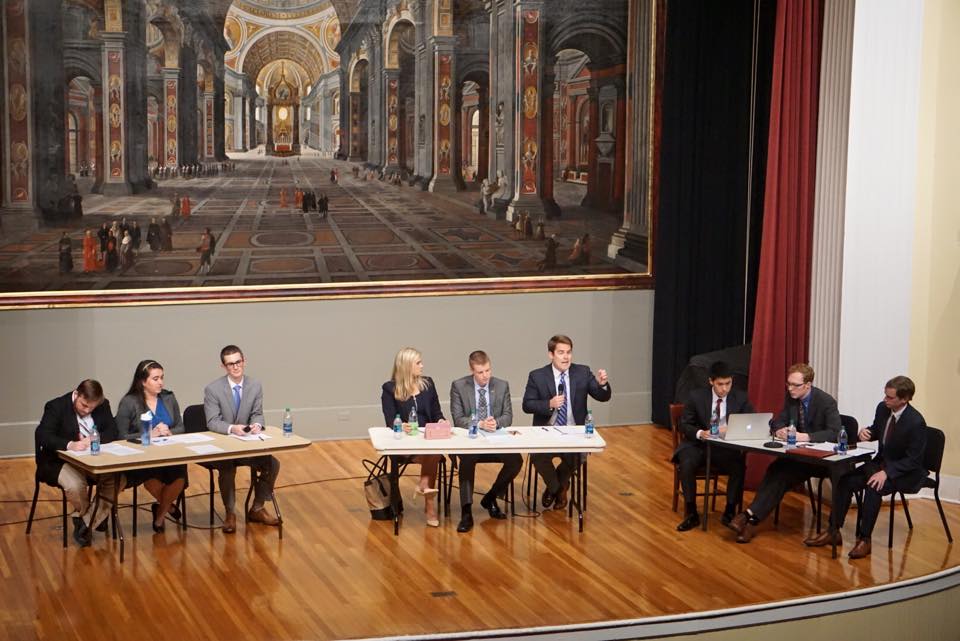
By: Jon Wilson
This primary season could turn into a race inundated with mudslinging and political attack ads. On Feb. 1, Kennesaw State University hosted Georgia’s second debate between Republicans vying for Saxby Chambliss’s soon-to-be open U.S. Senate seat. Eight candidates are running for the GOP ticket, including three prominent congressmen currently representing the state and Georgia’s former Secretary of State. However, for now candidates seem to be highlighting their conservative voting records and unwaveringly Republican policies. Like many Republican primaries in recent election years, the debate at Kennesaw showed that a majority of candidates appear to be moving to the right to appeal to the heavily conservative base of Republican primary elections.
Scott Johnson, Republican Party Chairman of the Georgia’s 11th District, began the Kennesaw Debate with a Christian invocation that gave thanks to the U.S. Military and democracy, followed by a collective recitation of the Pledge of Allegiance. Even before the debate, the introductory speakers established a decidedly conservative tone, accentuating the GOP’s stance on prayer, military support, patriotism, and American exceptionalism. Regarding policy, the major and minor candidates often disagreed in the debate. Political experience distinguishes between major and minor candidates in this context; those who have ever held public office are major candidates and those who have never held public office are minor candidates. The major candidates include Congressmen Paul Broun, Phil Gingrey, and Jack Kingston, along with former Secretary of State Karen Handel, while the minor candidates include patent attorney Art Gardner, activist Derrick Grayson, CEO of Dollar General David Perdue, and businessman Eugene Yu. Unlike major candidates for the race, minor candidates appealed to moderates in their opening statements. Eugene Yu believed that “America’s success lies in its diversity and differences among its people,” while Art Gardner stated that the Republican Party will not succeed in future elections unless it moderates itself to appeal to a wider variety of voters.
Conversely, the major candidates’ opening statements focused on traditional Republican ideals and conventional conservative Republican policies. Karen Handel emphasized overspending and overregulation as the two biggest issues facing the nation, while also highlighting her own policy achievements as Secretary of State and Chairwoman of the Fulton County Board of Commissioners. Congressman Phil Gingrey noted that the debate was taking place in his 11th Congressional District and differentiated himself from his competitors by repudiating them as careerist politicians, simultaneously noting his existing medical practice. Gingrey also uttered the first of many mentions of the Affordable Care Act – solely in the form of Obamacare – while also exciting the crowd by ending his opening statement with “Amnesty over my dead body” in reference to immigration. Congressman Paul Broun, current representative of most of Athens, focused on the ACA and his promise to repeal it if elected, stating that he was the only “real conservative” participating in the debate. Finally, Congressman Jack Kingston emphasized his congressional successes and lifelong membership in the Republican Party, and continued the trend of mentioning the ACA, ending a series of opening statements where the frontrunners positioned themselves as hardline conservatives.
The questions following the candidates’ opening statements concerned several topics, including university students’ concerns with finding jobs after graduation, repealing the ACA, comprehensive tax reform, President Obama’s recent myRA proposal in the State of the Union Address, foreign policy, and the elimination of the federal gas tax. The candidates continually retargeted issues in the questions to match their rhetoric, most often referring to the ACA as a tangential problem related to several of the questions asked. Most notably, in the question about university students’ concerns, Congressman Broun highlighted his recent visit to UGA and his time talking to students, using the experience as a prime opportunity to criticize the ACA for reducing the number of jobs in the nation and in Georgia, and stated that he would “improve jobs for college students by eliminating the job-killing” ACA.
The major contenders continued to endorse conservative principles and mentioned several recognized hot-button issues. On the question relating to tax reform, Congressmen Broun, Gingrey, and Kingston all stated that they supported various failed tax reform bills, including reducing income taxes and corporate taxes, and bills that would implement a FairTax system. Handel used current widespread unpopular opinion of Congress to criticize Broun, Gingrey, and Kingston for failing to pass comprehensive tax reform and for failing to repeal the ACA. Frequent criticisms of President Obama were also common, with Handel, Gingrey, Broun, and Kingston periodically focusing on his failures. In addition, Kingston and Broun invoked the popular President Reagan’s words, further appealing to the conservative base. On the issue of foreign policy, ideologically speaking, the minor candidates once again moved to the middle while the major candidates appealed to the right. Gingrey believed Iran to be the United State’s largest threat to national security, advocating for tougher sanctions against the nation, while Broun advocated for eliminating foreign aid to countries that oppose America. Kingston and Handel also invoked Republican foreign policy by stating their unwavering support for Israel.
In such a polarized political climate, primaries can mean the difference between a major party winning and losing. Debates provide a forum for candidates to express their opinions and beliefs on a wide variety of policies. In addition, in primaries they provide spectators the ability to observe the ideological trajectory of candidates’ futures, as candidates in any race attempt to adjust to their new potential constituency. The consequences of this primary cannot be overstated. While Georgia is far from a Democratic-leaning state, perhaps Democrats will have something of an advantage, given their unison behind Michelle Nunn, thereby eliminating the prospect of a partisan Democratic primary. Regardless, the candidates’ performances in the Kennesaw Republican Debate for Georgia’s U.S. Senate seat prove that this year’s Republican Primary is a race to the right.

